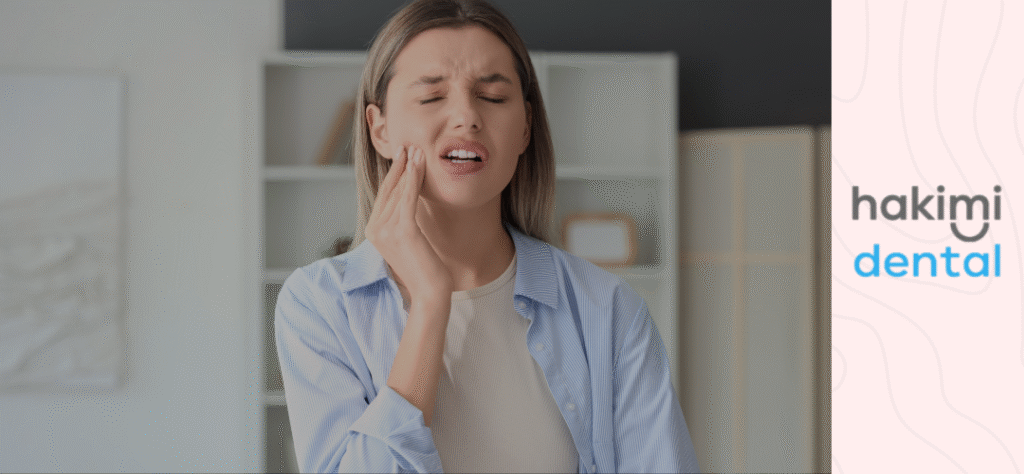An Oldbury dentist’s guide (and what to do)
If a tooth has just been knocked out, you’ve got a short window to save it. I’m writing this as a practising dentist to give you clear, friendly, step-by-step advice you can trust. Whether it’s a child with a milk tooth knocked out or an adult who’s taken a hit during sport, knowing how to handle a knocked-out tooth can make the difference between keeping the tooth and losing it.
If you’re near Oldbury and need urgent help now, call our Emergency Dentist in Oldbury or reach us via Contact Us. You can also explore our services on the Hakimi Dental Clinic website.

Quick takeaway (if you read nothing else)
Adult tooth knocked out? Find it, hold it by the crown (the white part), rinse gently, and try to put it back in the socket once (if the person is conscious and able). Bite on a clean cloth to hold it in place. If you can’t replant it, store it in milk or the person’s saliva and get to us within 30–60 minutes.
Baby tooth knocked out? Do not put it back. Call us for advice and to check the adult tooth underneath.
Bleeding? Apply firm pressure with gauze or a clean cloth for 10–15 minutes.
Tetanus? If there’s a dirty injury or it’s been a long time since their last jab, they may need a booster—your GP or urgent care can advise.
For urgent appointments or calm, expert guidance, reach out to our Emergency Dentist in Oldbury team or Contact Us now.
Why time matters
Teeth aren’t just bone; they’re supported by tiny fibres (the periodontal ligament). When a tooth is out, those fibres start to dry out and die. If we can keep them moist and get the tooth back in its socket quickly, the chances of long-term success go up a lot. That’s why knowing how to handle a knocked-out tooth is so important.
Step-by-step: how to handle a knocked-out tooth (adult/permanent tooth)
This is the gold-standard approach that we follow in the clinic and advise our patients to use at home in the first minutes:
Stay calm and check for other injuries. If there’s head trauma, loss of consciousness, heavy bleeding that won’t stop, or breathing issues, call 999 first.
Find the tooth and pick it up by the crown. That’s the white chewing part. Do not touch the root. Those root surface cells are delicate and essential for reattachment.
If dirty, rinse briefly. Use cold running water or saline for a few seconds. Don’t scrub, don’t use soap or alcohol, and don’t dry it.
Can a knocked out tooth be put back in?
Yes, often. If the person is alert and cooperative, try to replant it there and then:Gently line the tooth up (it should look like a mirror image of the one on the other side).
Push it into the socket with steady, gentle pressure.
Bite down on gauze, a clean cloth, or a cotton handkerchief to hold it in place.
If you can’t replant it, keep it moist. Best options, in order:
Milk (preferably full-fat) in a clean container.
Saliva: Have the patient spit into a pot and place the tooth in it. (For older children/adults only.)
Between cheek and gum (older, sensible patients only—not small children due to choking risk).
Saline solution.
Last resort: cling film to stop it drying out while you travel.
Avoid plain water for long periods; it can damage the root cells.
Control bleeding. Fold gauze or a clean cloth and press firmly over the socket for 10–15 minutes.
Call us immediately. Let us know you’re on your way so we can be ready:
Learn more about our team and approach: Hakimi Dental Clinic
Repeating the key message: can a knocked out tooth be put back in? In many cases, yes—and the sooner it’s reinserted (ideally within 30 minutes), the better the outlook.
Important: milk teeth (baby teeth)
If a milk tooth knocked out situation happens:
Do not put the baby tooth back in.
Place a pad and ask the child to bite gently for 10–15 minutes to control bleeding.
Keep the tooth (we may need to see it).
Book a prompt examination so we can check the gum and assess the adult tooth underneath.
Offer soft foods, avoid hot or cold extremes, and use children’s pain relief as advised.
We deal with milk tooth knocked out injuries often. If you’re unsure what tooth has come out, take a quick photo and call our Emergency Dentist in Oldbury for guidance or Contact Us.
What we do when you arrive
At Hakimi Dental Clinic we follow evidence-based protocols for dental trauma:
Confirm the tooth type (baby vs adult) and the stage of root development.
Clean the socket and tooth gently if not already replanted; replant and stabilise with a small, flexible splint.
X-rays to check positioning and to rule out fractures or fragments.
Tetanus and antibiotics advice when indicated (e.g., dirty injuries, immune concerns).
Root canal treatment may be needed, especially for adult teeth with complete roots. Timing varies case by case.
Follow-up plan to monitor healing and watch for infection or resorption (where the body breaks down the root).
For urgent care, book via Emergency Dentist Oldbury or call using the details on Contact Us.
Pain relief and self-care at home
While you’re on the way or waiting to be seen:
Pain relief: paracetamol and/or ibuprofen (if suitable for you) can help. Always follow the packet or pharmacist advice.
Cold compress: hold to the cheek in short intervals to limit swelling.
Soft diet: yoghurt, soup (lukewarm), scrambled eggs; avoid biting on the injured area.
Oral hygiene: keep it clean with gentle brushing; a warm saltwater rinse can soothe.
Avoid smoking and alcohol while healing.
If anything feels worse—more swelling, fever, or a bad taste—please Contact Us straight away.
Sports, cycling, and playground accidents
Contact and collision are common causes of avulsion (the dental term for a tooth that’s come out). A custom mouthguard is the best protective measure for sport. We make these in practice; they’re comfortable, fit well, and protect far better than off-the-shelf versions.
Ask about mouthguards during your next check-up at Hakimi Dental Clinic or reach our team on the Emergency Dentist in Oldbury page if you’ve had an incident and need advice now.
Common mistakes to avoid
Scrubbing the tooth or touching the root.
Letting it dry out. Keep it in milk or saliva if you can’t replant it.
Using disinfectants on the tooth.
Delaying treatment. Minutes matter—call our Emergency Dentist Oldbury service.
Replanting a baby tooth. If a milk tooth knocked out injury occurs, keep it out and call us.
Can I prevent this from happening again?
You can’t reduce the risk to zero, but you can lower it:
Wear a custom mouthguard for contact and ball sports.
Always use seatbelts and appropriate child car seats.
Keep stairs and play areas free of trip hazards.
Maintain regular dental check-ups so we can spot and advise on any issues (areas of bone loss or gum problems can make teeth more vulnerable).
Book a check-up or ask about mouthguards via Contact Us or browse Hakimi Dental Clinic for more information.
FAQs about knocked out tooth
Pick it up by the crown, rinse gently if needed, and replant it immediately if it’s an adult tooth and the person is able. Bite on a clean cloth to hold it in. If that’s not possible, store it in milk or saliva and head to us straight away via Emergency Dentist Oldbury or Contact Us. This is the essence of how to handle a knocked-out tooth.
Often, yes—if it’s an adult tooth and you act quickly. Ideally within 30 minutes. Handle it by the crown and try to put it back in once. Can a knocked out tooth be put back in after a longer delay? Sometimes, but success rates drop with time. Come to Hakimi Dental Clinic as soon as you can.
If a milk tooth knocked out incident occurs, don’t replant it. Apply gentle pressure to stop bleeding and call us for an assessment to make sure the adult tooth underneath is safe. Book via Contact Us.
If you can’t replant it, milk is a good, practical option because it helps keep the root cells alive for longer. Saliva and saline are also acceptable. Plain water is not ideal for long periods. For personal guidance, call our Emergency Dentist in Oldbury team.
It depends. Many adult teeth with fully formed roots will need root canal treatment after replantation to prevent infection. We’ll advise on the timing once we’ve stabilised the tooth and taken X-rays. We’ll plan this with you at Hakimi Dental Clinic and answer any questions at your visit.
